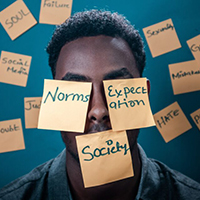Let's talk about masculinity
 What does it mean to be a man? Does our society still favor gender normative behaviors,
or are those stereotypes beginning to dissipate in today's world?
What does it mean to be a man? Does our society still favor gender normative behaviors,
or are those stereotypes beginning to dissipate in today's world?
Although the answer may not be clear, we do know one thing for sure – the expectations society places on men today to be ‘man enough' have consequences. For example, a recent report from the Pan American Health Organization revealed that 1 in 5 men will not reach the age of 50 (in Northern America) due to issues relating to unhealthy masculinity. Society's expectation for men to be providers, engage in risk-seeking behaviors, be sexually dominant, and avoid discussing their emotions or seeking help are all examples of the issues related to unhealthy masculinity.
Urban dictionary defines masculinity as “the trait(s) of behaving in ways considered typical for men.” It's important to note that masculine traits are not all unhealthy. A lot of traits society deems as being “masculine” are positive, healthy, and commendable. Leader, mentor, knowledgeable, intentional, inspirational, selfless, and supportive are also descriptors commonly attributed to masculinity.
Masculinity affects everyone, and that's why, here at the Center for Campus Wellness, we are on a mission to intentionally explore how masculinity is interwoven with gender-based violence and mental health, to disrupt harmful attitudes and behaviors, and to engage with students across campus.
In the first two months as the engagement coordinator, I have been working to connect our office with campus partners to discuss how we can work together to engage students with the topics of masculinity, gender-based violence, and mental health. I am excited to have students back on campus in the fall, begin these conversations, and create a campus environment inclusive of all forms of masculine expression.
In the 2021-2022 academic year, the Center for Campus Wellness will be co-hosting a discussion series with our partners to allow students to talk about locker room talk, body image, men in the media, mental health challenges between genders, etc. In addition, be on the lookout for larger campus-wide events that will take place during Domestic Violence Awareness Month (October), Masculinity Month (November), Healthy Relationships Month (February), and Sexual Violence Awareness Month (April). There will be many new and exciting opportunities for all students, regardless of their gender identity, to participate in meaningful conversations and learn from one another.
At the Center for Campus Wellness, we know the power of peer-to-peer relationships, which is why we will be launching a new ambassador program specifically to support this work of engaging male-identified students on campus. These ambassadors will receive training to facilitate discussions, support campaigns and events, and serve as leaders in engaging male-identified students on campus. If you or someone you know may be interested in becoming an ambassador, you can contact Myra Gerst at mgerst@sa.utah.edu or be on the lookout for an application in the upcoming month!
With this being a new program, please let us know if you have ideas for collaboration or partnership! Your input is valued and appreciated.
Categories
Featured Posts
Blog Archive
- August 2023 (1)
- November 2023 (1)
- October 2023 (1)
- September 2023 (1)
- April 2024 (2)
- December 2024 (1)
- February 2024 (1)
- January 2024 (1)
- July 2024 (1)
- June 2024 (1)
- March 2024 (3)
- May 2024 (2)
- November 2024 (2)
- October 2024 (2)
- September 2024 (1)
- 2019 archive (2)
- 2020 archive (25)
- 2021 archive (28)
- 2022 archive (11)
- February 2025 (3)
- March 2025 (3)
- April 2025 (1)
- May 2025 (1)
- June 2025 (1)
- July 2025 (1)
- August 2025 (1)
- September 2025 (2)
- October 2025 (3)
- November 2025 (2)
- December 2025 (2)
- January 2026 (3)
- February 2026 (1)
